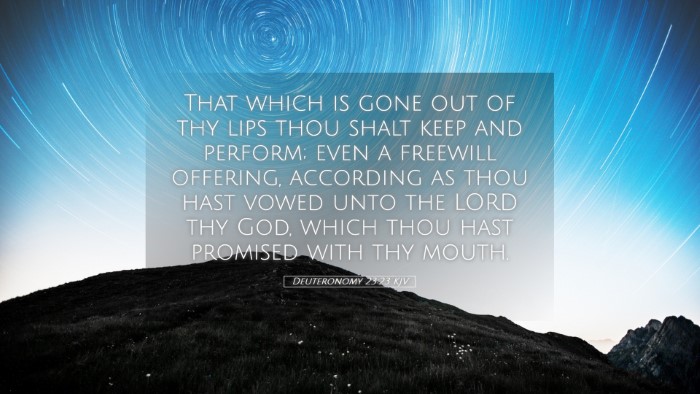Commentary on Deuteronomy 23:23
Verse: "That which is gone out of thy lips thou shalt keep and perform; even a freewill offering, according as thou hast vowed unto the LORD thy God, which thou hast promised with thy mouth."
Introduction
Deuteronomy 23:23 emphasizes the importance of keeping one's word, especially in the context of vows made to God. This principle transcends mere ritual; it speaks to the integrity of one’s character and the sacredness of promises. In this commentary, we draw upon insights from Matthew Henry, Albert Barnes, and Adam Clarke to explore the spiritual, ethical, and practical implications of this verse.
Contextual Background
The book of Deuteronomy serves as a farewell address from Moses, reiterating the covenant laws to the Israelites as they prepare to enter the Promised Land. Chapter 23 addresses various issues concerning community purity, worship, and the Israelites' relationship with God. The specific verse in question underscores the call to fulfill promises, especially those made willingly and joyfully to God.
Exegesis and Insights
Keeping Promises
Both Henry and Clarke emphasize that this verse highlights a fundamental aspect of God's character: faithfulness. God holds His people accountable to their words. The phrase "that which is gone out of thy lips" suggests an awareness that our spoken commitments carry weight before God.
Albert Barnes notes that the Hebrew term used here for "keep" implies active engagement—one should not only intend to fulfill a vow but must execute it with diligence. This theme of fidelity mirrors God’s own reliability to His promises.
Freewill Offerings
The mention of "freewill offerings" is significant. These are gifts given voluntarily out of love and gratitude rather than obligation. Matthew Henry points out that such offerings symbolize the willingness in worship and the importance of an open heart towards God. The voluntary nature further signifies a relationship built on trust and love, where one's offerings reflect an inner devotion rather than mere external compliance.
Clarke adds that while these offerings are made freely, once promised to God, they become a binding commitment, reinforcing that our freewill does not exempt us from the responsibility of fulfilling vows. It reflects a blend of liberty in giving and accountability in commitments.
Theological Implications
Covenantal Relationship with God
Theological reflection on Deuteronomy 23:23 reveals deep covenantal themes. Each vow reflects a commitment within the broader context of Israel's covenant relationship with God. Barnes highlights that through vows, the worshipper acknowledges God’s sovereignty and providence, positioning oneself in a posture of submission and respect.
This verse calls to mind the New Testament echo of this principle, where Jesus Himself taught about the significance of keeping one’s word (Matthew 5:37). The continuity from the Old Testament practices to New Testament standards emphasizes an enduring principle of integrity.
The Nature of Promises
Promises, especially to God, are not taken lightly in Scripture. Henry highlights the moral weight carried by our words. Failing to uphold vows may lead to spiritual consequences, as it reflects not only on our character but also on our understanding of God’s nature.
Clarke notes that understanding the seriousness of promises requires a heart willing to reflect on one's intentions prior to making any commitment. This is not merely about transactional obedience; it calls for a transformation of the heart towards sincerity in one’s dealings with God.
Practical Applications
Integrity and Accountability
Pastors and students of theology must recognize the implications of Deuteronomy 23:23 in their own practices. Living out the integrity of promises made to God can influence the faith community. Whether in prayer, financial offerings, or commitments to ministry, the theme of consistency should resonate.
Leaders are encouraged to cultivate a culture where promises are respected and accountability is honored. Barnes reminds us that communal adherence to this principle strengthens the body of Christ and places an emphasis on the need for unity in fulfilling commitments.
Encouragement for Personal Reflection
The verse encourages personal reflection on one’s own vows. Are they taken seriously? Is there a conscious effort made to align actions with spoken commitments? Henry emphasizes the joy that comes from fulfilling promises as an overflow of a grateful heart.
Individuals are encouraged to take time in prayer to assess their commitments to God and others—striving for a life marked by faithfulness in both spiritual promises and everyday interactions.
Conclusion
In summary, Deuteronomy 23:23 serves as a powerful reminder of the weight of our words and the significance of keeping our promises to God. Drawing from the insights of Matthew Henry, Albert Barnes, and Adam Clarke, we understand that this verse not only speaks to individual integrity but also touches upon the heart of our covenant relationship with God. In an age where commitments can often be flippantly made and broken, this verse calls us back to a place of sincerity, responsibility, and deep faithfulness—qualities that honor God and serve to edify the community of believers.


